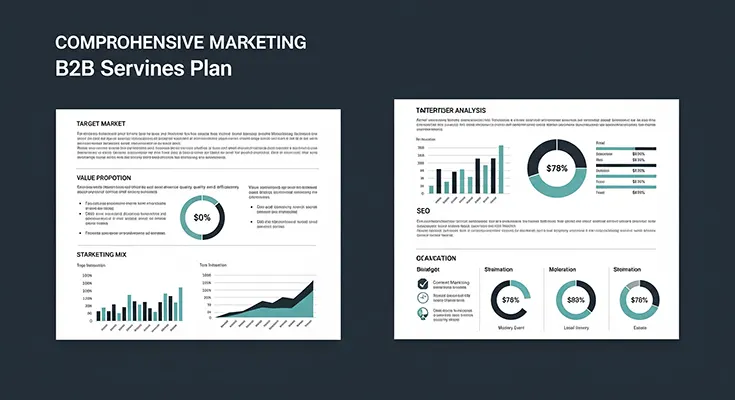In today’s competitive business landscape, having a well-defined marketing strategy is essential for success, especially for B2B service companies. A comprehensive marketing business plan serves as a roadmap to effectively promote services, generate leads, and build strong relationships with business clients. Here are key steps to develop a robust marketing business plan tailored to the unique requirements of a B2B service company.
1. Understand Your Target Market
Identifying and understanding your target market is the foundation of any successful marketing strategy. Conduct market research to define your ideal B2B clients, including their industry sectors, pain points, buying behaviors, and decision-making processes. This insight will guide your messaging, positioning, and targeting efforts.
2. Define Your Unique Value Proposition
Clearly articulate the value that your B2B service company offers to clients. Highlight how your services address specific challenges, provide solutions, and deliver measurable results that differentiate you from competitors. Your unique value proposition should resonate with the needs and priorities of your target market.
3. Set Clear Marketing Objectives and Goals
Establish specific, measurable, achievable, relevant, and time-bound (SMART) marketing objectives that align with your overall business goals. Whether it’s increasing brand awareness, generating leads, nurturing client relationships, or expanding market share, having clear objectives will guide your marketing efforts and measure success.
4. Develop a Multi-Channel Marketing Strategy
A successful B2B marketing plan encompasses a mix of online and offline channels to reach and engage target clients effectively. Consider digital marketing tactics such as content marketing, social media campaigns, email marketing, search engine optimization (SEO), and pay-per-click (PPC) advertising, as well as traditional tactics like industry events, networking, and direct mail.
5. Create Compelling Content and Thought Leadership
Content marketing is a powerful tool for B2B service companies to showcase expertise, build credibility, and educate potential clients. Develop high-quality content such as whitepapers, case studies, blog posts, webinars, and guides that address industry challenges, share insights, and demonstrate the value of your services. Establish thought leadership in your niche to attract and engage prospects.
6. Implement Account-Based Marketing (ABM) Strategies
Account-Based Marketing (ABM) is a targeted approach that personalizes marketing efforts for key client accounts. Identify high-value B2B clients and tailor your messaging, content, and outreach activities to address their specific needs and pain points. ABM helps deepen client relationships, improve engagement, and drive conversions.
7. Leverage Customer Relationship Management (CRM) Systems
Utilize CRM systems to manage client data, track interactions, and nurture leads throughout the sales cycle. A CRM system enables personalized communication, lead scoring, analytics, and segmentation, allowing you to create tailored marketing campaigns that resonate with B2B clients and drive conversions.
8. Monitor and Measure Marketing Performance
Regularly monitor and analyze key performance indicators (KPIs) to evaluate the effectiveness of your marketing strategies and campaigns. Measure metrics such as lead generation, website traffic, conversion rates, customer acquisition costs, and return on investment (ROI). Use data insights to optimize marketing efforts and make informed decisions to drive business growth.
Developing a comprehensive marketing business plan for a B2B service company requires a strategic approach that aligns with the unique needs and dynamics of the B2B market. By understanding your target audience, defining your value proposition, setting clear objectives, leveraging multi-channel strategies, and prioritizing client relationships, you can create a tailored marketing plan that drives engagement, generates leads, and builds long-term success for your B2B service company.
Remember, a well-crafted marketing plan is not just a roadmap but a dynamic tool to adapt to changing market trends, client needs, and business goals, ensuring sustainable growth and competitive advantage in the competitive B2B landscape.





